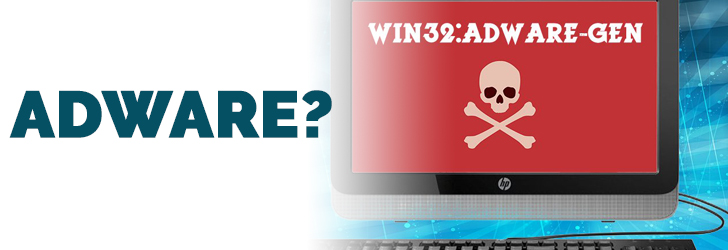
Adware is a form of malware which displays advertisement on user's screen with (or in most cases without user's consent) for the benefit of creator. Sometimes, a user's search request is redirected to an advertising website based on the marketing data stored on a user's computer. The creator gets paid for redirecting or referring traffic to advertising website on a pay-per-click basis. This has led to adware becoming quite intrusive on numerous websites and applications in a constant attempt for its developers to benefit from it. These methods included having a banner, video, pop-up, static box, or any other container appearing someone on the user's screen, usually in a position that makes them click it accidentally or otherwise.
This desire for revenue have led to some developers creating adware in an even more perverse way where it downloads itself onto a person's system without their permission. Typically, it is this definition which the Microsoft Encyclopedia of Security defines as a form of malware.
Prevention and Protection
Once again, an adware is one of many form of malware, which most AntiVirus software today now counter against malicious and intrusive adware software. As such, antivirus suites make for good deterrents against these pieces of software.
Pop-up blockers and ad-blockers also do a great job of removing advertisements from adware online. AdBlock Plus and uBlocker, in particular, are two popular browser extension solutions which work really well.
Alongside ad-blockers are some unique browsers which market themselves as being strict against advertisements. While Google Chrome and Mozilla Firefox have made their additions to deter the intrusive nature of advertisements, they can only do so much on their own. As such, web browsers such as Brave design themselves as being a solution to the onslaught of advertisements that exist on the Internet.
A good rule of thumb to follow while browsing is to be mindful of what and where you're clicking on a webpage. Most advertisements try to be sneaky in an attempt to get their revenue for "pay-per-clicks" by hiding the ads as "play buttons" on streaming and video websites; misleading unsuspecting users into clicking them. As such, one must keep a keen eye out for such tricks and ensure they do not click such advertisements less they end up downloading some software they don't intend to use. By that same token, one should not be easily fooled by any banners telling you your machine has a virus or that it can fix a vulnerability found in the system. Any software which finds an issue within your system must first be downloaded and run a scan to be able to do it; if you're sure you did not do any such thing, then those flashing warning lights are nothing more than a malware.
Share this post
Leave a comment
All comments are moderated. Spammy and bot submitted comments are deleted. Please submit the comments that are helpful to others, and we'll approve your comments. A comment that includes outbound link will only be approved if the content is relevant to the topic, and has some value to our readers.

Comments (0)
No comment